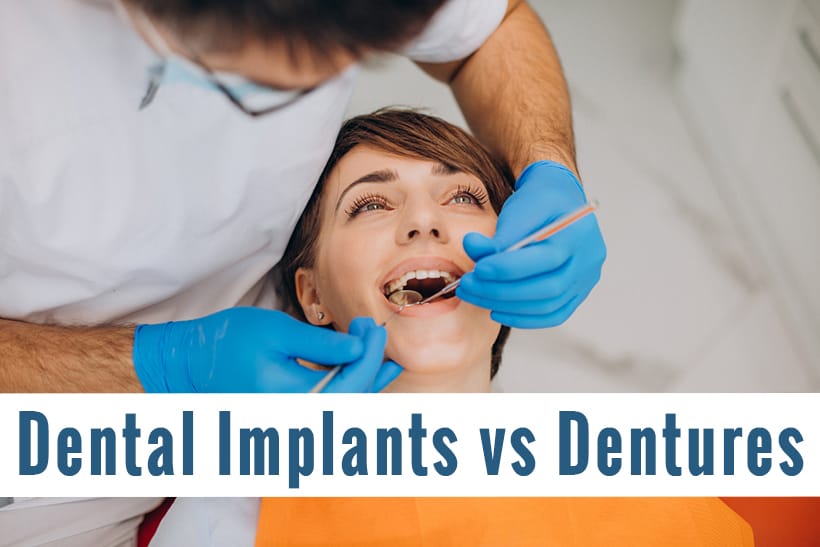
Missing teeth can affect your ability to do everyday things like chewing, talking, and even smiling. Every tooth in your mouth is essential, so even if you are missing one tooth, it can negatively affect you. The good news is that there are many ways that you can replace your missing teeth and address this issue. Two of the most common solutions to replacing missing teeth are dentures and dental implants.
Pros And Cons Of Dentures
Dentures, commonly referred to as false teeth, are made of materials like porcelain, acrylic, or cast metal. It is important to note that there are many different types of dentures and one type might be a better fit for you than another. Knowing the pros and cons of dentures and implants can be very helpful in your decision-making process of figuring out which option is best for you!
Pros Of Dentures
Wearing dentures can provide many benefits for your mouth and your health:
- Restores the function of your teeth: Dentures help you to chew your food again..
- Improves your smile: Even though dentures are false teeth, they can be color matched to your natural teeth and leave you with a beautiful smile.
- Boosts your confidence: Dentures can enhance your personal and professional life. With dentures, you no longer have to worry about smiling with missing teeth.
- Helps facial shape: As time goes by, missing teeth can cause the muscles on your jaw to sag. Dentures can help support your face as your natural teeth did.
- Custom-fit for your mouth: This also allows your dentist to make sure that the dentures are a comfortable fit for you.
- Minimal effort to clean: You should remove your dentures daily to clean them with a soft-bristle toothbrush and let them soak overnight in a special cleaner.
- Cost effective solution: Initially dentures are one of the most cost effective solutions when it comes to replacing missing teeth.
Cons Of Dentures
There are some things to be mindful of when choosing dentures to replace missing teeth:
- Fit: Dentures can become loose sometimes which can lead to speaking or eating problems. Poor fit can also cause irritation in the gum tissue.
- Increased infection: Homecare is essential with dentures to avoid thrush, yeast infections, and bad breath.
- Adjustment period: It is common to need a few weeks to adjust to wearing dentures. Talking and eating with them will feel different until you adjust to wearing them.
- They typically last 5-8 years: Your facial structures change with age, and dentures will need to be adjusted or remade to keep them fitting properly.
Pros And Cons Of Dental Implants
An implant is a dental fixture that is surgically placed into your jawbone, and it acts as a replacement for the root of a missing tooth. After surgery, the implant is then given several months to fuse with the bone. Now a crown, bridge, or denture can be added to the implant and used for chewing, speaking, and smiling.
Pros Of Dental Implants
There are many benefits to dental implants:
- Longevity: Unlike dentures, your implant may last for your entire life. Only in rare cases does an implant need to be redone.
- Restores the function of your teeth: Following the initial three-month wait period for your crown to be added to the top of your implant, you will be chewing, talking, and smiling just like you did with your natural tooth.
- Maintains bone and face shape: Since implants are placed into the jaw bone, this keeps your jaw bone strong and healthy.
Cons Of Dental Implants
- Investment: Dental implants have the highest initial cost, but it’s essential to think about their longevity because they may be more affordable in the long run.
- Three-month wait period: It will be 3-4 months after surgery before the crown can be added to the implant. This waiting period may be challenging for a patient looking for instant results for their missing teeth.
- Homecare: Even though an implant can’t decay, it is crucial to keep it clean. Flossing and brushing are important for keeping gum tissue healthy around the implant and crown.
Which Is Best?
There is always much to consider when it comes to options for replacing missing teeth. How many teeth are missing, bone levels, cost of treatment, and patient preference can all be factors that play into what will be best for you. In dentistry today, dental implants are considered the standard of care for replacing teeth because of their longevity and convenience.
However, dentures can still be an excellent and possibly more affordable option for you. Talk to your dentist today, and together you can figure out the best way to replace your missing teeth.



Leave a Reply